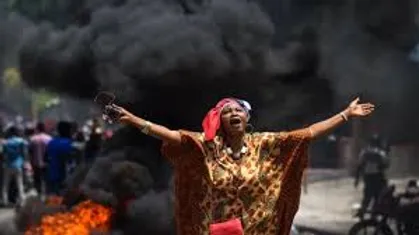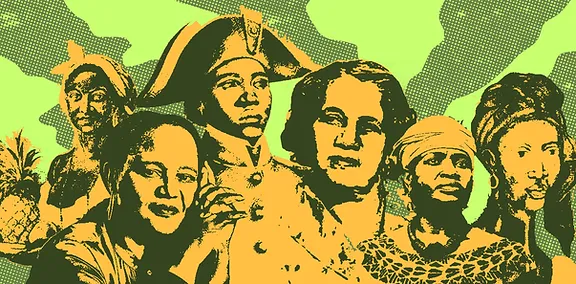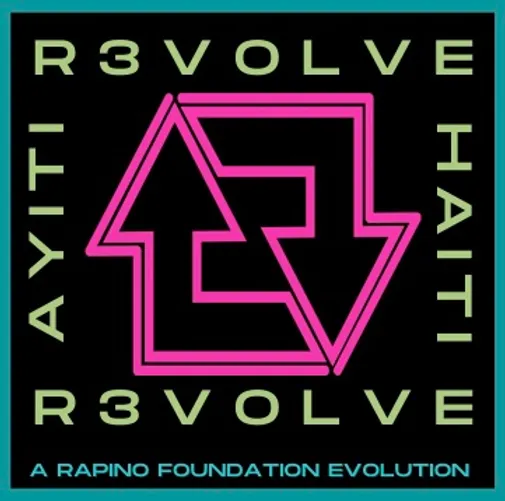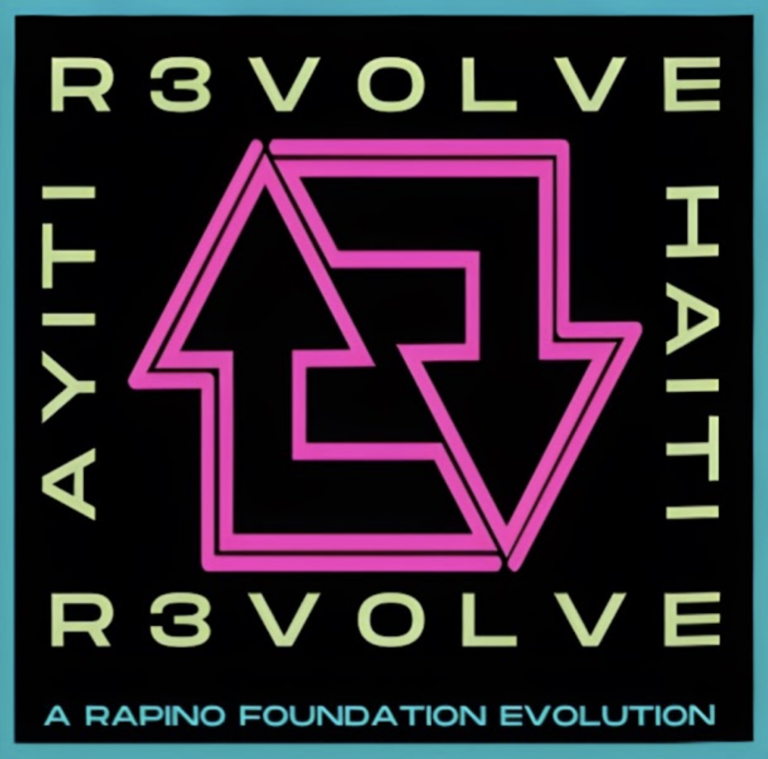Latinas in the U.S. come from a long line of influential, barrier-breaking, rebel Latin American women. Through Remezcla’s Herstoryseries, we introduce you to the women warriors and pioneers whose legacies we carry on.
Without the Haitian Revolution, there would be no Latin America today. Although Haiti was central to the creation of Latin American states, the fight for abolition of slavery and regional liberty from colonial oppression, few of those who consider themselves Latinx today know the role Haiti played in helping them overthrow the chains of Spanish oppression.
We tear down the oak of oppression one childish swing at a time.
Believe in your ability, your strengths, and let that fuel your ambitions. The only time you should stop promoting social changes is when you’re six feet under. Because time is everything. Make sure you leave your mark in this world. Claude-Marthe D. Cherizard
Haitians liberated Dominicans from slavery in 1801 and again in 1822 to unite the island and form the only free Black republic and a haven for runaways from across the region, despite the constant threats in a sea of slave-owning nations. Haiti supplied Santo Domingo with troops and weapons to win their independence from Spain in 1865 after they were re-colonized once again. Haitians provided Simón Bolívar with weapons, military strategists and veterans from Haiti’s revolution as well as a safe haven, with the promise that Bolívar would free the enslaved Africans of South America once the nations were liberated – a promise he broke.
Haitian women have also been instrumental in shaping women’s rights movements around the region as well as on the frontlines of our struggle for equal rights and liberation, both literally and figuratively. By acknowledging the role of Haitian women today, we hope to acknowledge the role that all Black women continue to play in our collective liberation throughout Latin America and the Caribbean.
Adbaraya Toya
Originally from the Kingdom of Dahomey (currently Benin), Adbaraya Toya was a midwife, a warrior of the “Dahomey Amazons” a healer and one of the women who sat on Dahomey’s council. She was abducted and enslaved in Saint-Domingue (modern-day Haiti), where she was renamed Victoria Montou. She secretly began training others in the art of war, including one of Haiti’s founding fathers, Jean Jacques Dessalines.
She taught him and many others how to fight in hand-to-hand combat and how to wield a knife. She commanded her own brigade in the Haitian war of independence. To honor her contributions, she was honored with a state funeral in 1805.
Don’t ever underestimate the importance you can have because history has shown us that courage can be contagious and hope can take on a life of its own.
– Michelle Obama
Cécile Fatiman
Cécile Fatiman was the daughter of an enslaved African woman and a white Frenchmen, thought to be the prince of Corsica. Her father sold her and her mother to a plantation in Saint Domingue, while history remains unsure as to where her brothers were sold to.
Cécile was a mambo, a Vodou high priestess, whose primary responsibility was maintaining the rituals and relationship between the spirits and the community. She traveled in the darkness of the night, from one plantation to another, to persuade both those enslaved and the maroons to attend a secret meeting in the forest, known as Bois Caïman. This Vodou ceremony encompassed both a religious ritual and a meeting to plan the uprising against slavery that became known as the Haitian Revolution. Not only was Cécile instrumental in the creation of Haiti, she later became first lady after marrying President Louis Michel Pierrot, a former soldier in the Haitian Revolution.
Sanité Belair
Suzanne Sanité Belair was a young free woman of color from L’Artibonite, Haiti. In 1796, she married Charles Belair – Haitian revolutionary leader Toussaint Louverture’s nephew. Despite not being enslaved, she and her husband fought side by side in the Haitian army to help others gain their freedom from the French. She eventually earned the title of lieutenant.
Captured by the French in 1802, she didn’t kneel or have her eyes covered when she was executed. Instead, she stood tall and looked the executioner in the eye and shouted to the people, “Liberty, no to slavery!” before her death.
Alice Garoute
Haitian suffragist and women’s rights advocate Alice Garoute helped form a book club that quickly turned into a political organization because of US military occupation. The book club raised money and sent a delegation to Washington, D.C. to demand that the US military stop sexually assaulting Haitian women as a way to inflict terror on the community. Congress was unresponsive, but the group earned W.E.B. DuBois’ and the NAACP’s support.
When she died in 1950, she asked that flowers not be placed on her grave until all Haitian women were granted the right to vote, which happened seven years later.
Yvonne Hakim-Rimpel
Journalist, human rights activist and feminist movement leader Yvonne Hakim-Rimpel co-founded the Women’s League of Social Action, the country’s first feminist organization, in 1934. She went on to create L’escale, the first feminist Haitian newspaper.
The biweekly paper denounced the fraudulent elections that brought François Duvalier to power, something that made her a target of his brutal regime. Men invaded her home in January 1958, dragging her and her daughters out. She was tortured, raped and left for dead in a ditch. Rather than remain silent, she bravely encouraged the Women’s League to publish a letter of protest signed by 36 women, becoming a symbol of the resistance. The Duvalier regime remained undeterred, and four years after being attacked, she was dragged to the notorious Fort Dimanche prison and forced to denounce her accusations against the government in order to quell international criticism.
Ertha Pascal-Trouillot
Ertha Pascal-Trouillot was the provisional President of Haiti from1990 to1991, making her the first woman in Haiti’s history to hold that office. Moments after the chief of the army pledged his support for her presidency, Mrs. Pascal-Trouillot declared that she had ”accepted this heavy task in the name of Haitian women.”
She received her law degree from the École de Droit des Gonaïves, and eventually became the first woman justice of the Supreme Court of Haiti.
Maryse Vieux-Chauvet
One of the most important female writers of the 21st century, Maryse Vieux-Chauvet’s novel, Amour, colère, folie, is a feminist perspective of life under the Duvalier dictatorship. Although the book was published abroad, the regime banned it, fearing a social uprising and Vieux-Chauvet was forced into exile.
In 1973, the still-exiled Chauvet met an untimely death in New York, in total obscurity. Finally, in 2005, her novel was reissued and published for the first time in the 21st century. The work was translated in 2009, which introduced Chauvet to an English-speaking audience for the first time.
Catherine Flon
Catherine Flon, goddaughter of founding father Dessalines, served her country as a nurse during the revolution. She’s most remembered, however, for sewing the first Haitian flag.
In May 1803, Dessaline ripped the tricolor French flag – discarding the white stripe – and had Flon stitch together the remaining parts horizontally to create the first version of our flag. Initially believed to represent the Black and mixed-raced people of Haiti, scholars now believe the blue and red are an homage to Vodou.
Edwidge Danticat
Author Edwidge Danticat can be credited with bringing the beauty, complexity and pain of Haiti and its diaspora to a 21st century English-speaking audience, allowing the world to acknowledge the nation and its people beyond stereotypes and banal reporting. Born in Port-au-Prince in 1969, she lived in Haiti without her parents, who had fled Duvalier’s regime. In 1981, she was reunited with them and her youngest siblings in Brooklyn.
Danticat’s books include The Farming of Bones, an American Book Award winner; Breath, Eyes, Memory, an Oprah’s Book Club selection; and Krik? Krak!, also a National Book Award finalist. She’s also a 2018 Neustadt International Prize for Literature winner and the recipient of a MacArthur “Genius” grant.
She has also been an advocate for the rights of Haitian immigrants in the U.S. and the D.R.
Marleine Bastien
Marleine Bastien is the founder and executive director of Family Action Network Movement, an important group that provides desperately needed assistance to Haitian women and their families in Miami. A tireless advocate for the Haitian community, Bastien’s been at the forefront of issues, such as addressing the devastating impact of prolonged detention at Guantanamo had on Haitian children in 1995, the passage of The Haitian Immigration Refugee Fairness Act of 1998 and the ongoing fight for Temporary Protected Status and comprehensive immigration reform.
PetroCaribe Challenge Protestors

While Puerto Rican and Hong Kong protests have captivated the world, a year ago, Haitian youth launched a sophisticated social media campaign. The first-of-its-kind initiative culminated into year-long protests aiming to change the face of Haitian politics forever.
PetroCaribe, a petroleum program between Venezuela and number of Caribbean and Latin American countries, loaned the Haitian government money for social development programs and infrastructure at a low 1% interest rate. A senatorial commission released in 2017 found that $1.7 billion of these funds were misused.
Since Gilbert Mirambeau launched the #PetroCaribeChallenge asking where the money went, women – including Emmanuela Douyon, Pascale Solages, Gaëlle Bien-Aimé, Patricia Camilien and more – from all over Haiti have pushed the government for accountability, sparking a change in the culture of corruption and impunity in Haitian politics.
The protestors got a governmental audit of the funds, which showed embezzlement happened at the highest levels of government, implicating Haitian President Jovenel Moise. The group is now calling for his resignation and have put forward sophisticated proposals for a new vision for Haiti.





